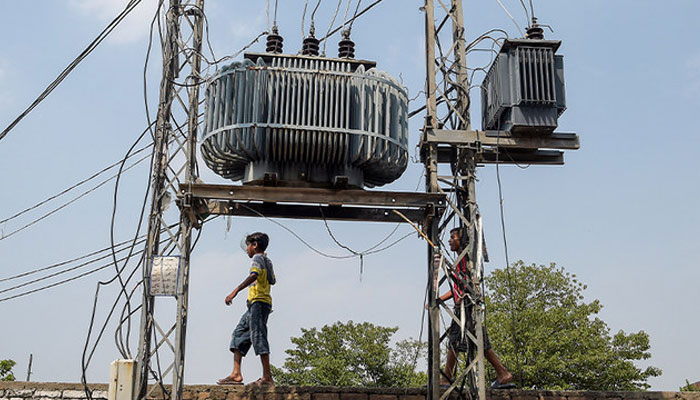Consumers foot the bill of grid constraints,violation of power plants merit order
Analysis of the dispatch summary revealed a significant disparity in power generation between the north and south regions
LAHORE: Gaps in electric transmission networks and mismanagement have rendered least-cost power generation projects inoperational, putting an enormous financial impact of over Rs300 billion per annum on the already strained national grid.
Power plants having about 4,500 MW low-cost generation capacity (thermal and coal) in the South region have been kept idle mostly at a time when electricity tariffs have hit all-time high levels. If these economic thermal and coal power plants are allowed to contribute in line with the official economic merit order (EMO) and hooked to the national grid up to capacity, the base electric tariff could be reduced by about Rs 2-3 per unit, sources claimed here Wednesday. Shutting down such efficient thermal plants is a violation of the official economic merit order, which prioritizes thermal power generation based on production costs. The coal-fired plants in the south must be assigned top priority as their production cost ranges between Rs5 to Rs14/unit in contrast to costly gas and RFO-fueled power plants in the North having Rs20 to Rs50 per unit generation rate.
Similar is the case of renewable projects in the South that have not been connected with the national grid fully. The construction of most of these thermal plants was initiated by the previous PMLN government but their full integration with the national grid remains a distant reality. Power managers in the federal capital acknowledged the problem of flawed electricity transmission networks. Talking to this scribe on the condition of anonymity, one of the senior officials of the Ministry of Power admitted that not employing thermal plants in the South contributed to the rising cost of power. He expressed the hope that after completion of Lahore North Grid and a new Matiari-RYK Transmission Line would help pass 2,000 MW additionally. The official conceded that in February 2024, the financial impact of shutting the efficient plant was about Rs2.5 per unit.
Senior officials concluded that merit order is subject to issues relating to system stability and transmission constraints but hastened to add that the national grid is not properly working despite efforts for its improvement. The sources lamented that violation of merit orders has regrettably become a norm now. For the last many months, the system operator has been violating EMO by operating power plants that rank lower in the merit order.
Analysis of the dispatch summary revealed a significant disparity in power generation between the north and south regions. The north is producing two-thirds of the total supply, while the south, where the average cost is lowest, is only producing one-third. When questioned, the system operator frequently cites transmission constraints and grid instability as the reasons for these violations. The difference in variable power generation costs between plants in the North and South can be as high as Rs15-35 per unit. Yet, due to so-called grid stability and transmission constraints, northern plants continue to operate at the expense of more cost-effective southern plants.
Based on May 2024 data, it is estimated that simply by removing these constraints and adhering to the EMO, the government could reduce the burden of approximately Rs25 to 28 billion per month from consumers, claimed sources. It means per annum the financial burden of poor governance in the power sector has been as high as Rs300 bn-Rs360 bn, which translates to a daily loss of about Rs821m-Rs920m.
-
 Bruce Springsteen Makes Strong Political Statement
Bruce Springsteen Makes Strong Political Statement -
 Prince Harry Relationship With King Charles 'not Straightforward,' Says Expert
Prince Harry Relationship With King Charles 'not Straightforward,' Says Expert -
 Truth Behind Jennifer Lopez's 'rude' Glambot Moment Laid Bare
Truth Behind Jennifer Lopez's 'rude' Glambot Moment Laid Bare -
 Nicole Richie Still Loves This Makeup Trend From Her Teen Years
Nicole Richie Still Loves This Makeup Trend From Her Teen Years -
 Meghan Markle Plans To Hide Behind Kids Over Return To UK
Meghan Markle Plans To Hide Behind Kids Over Return To UK -
 Dolly Parton Marks Major Milestone As State Governor Honors Her Legacy
Dolly Parton Marks Major Milestone As State Governor Honors Her Legacy -
 Karley Scott Collins Reacts To Rumours Of Her Dating Keith Urban
Karley Scott Collins Reacts To Rumours Of Her Dating Keith Urban -
 Meghan Markle Sends Shockwaves With Promise Of Chaos: ‘Has The Power To Upset The Royals’
Meghan Markle Sends Shockwaves With Promise Of Chaos: ‘Has The Power To Upset The Royals’ -
 Jesy Nelson, Zion Foster Call It Quits Amid Twins' Heartbreaking Diagnosis: Source
Jesy Nelson, Zion Foster Call It Quits Amid Twins' Heartbreaking Diagnosis: Source -
 What King Charles Told Princess Diana In Letter Before Wedding?
What King Charles Told Princess Diana In Letter Before Wedding? -
 David Crosby Said This One Singer Had 'no Talent At All'
David Crosby Said This One Singer Had 'no Talent At All' -
 Meghan Markle’s Return Risks Setting Off Something ‘exhausting’ And William, Kate Are Bracing
Meghan Markle’s Return Risks Setting Off Something ‘exhausting’ And William, Kate Are Bracing -
 Bruce Springsteen Reveals Singer He Finds To Be Greatest Rock And Roll Voice
Bruce Springsteen Reveals Singer He Finds To Be Greatest Rock And Roll Voice -
 Andrew Mountbatten Windsor Ensures Teddy Bear Collection Reaches New Home
Andrew Mountbatten Windsor Ensures Teddy Bear Collection Reaches New Home -
 Ben Affleck Recalls 'throwing Up' During 'Armageddon' Final Scene
Ben Affleck Recalls 'throwing Up' During 'Armageddon' Final Scene -
 Kevin Costner Marks 71st Birthday With Decades-old Throwback Photos
Kevin Costner Marks 71st Birthday With Decades-old Throwback Photos




